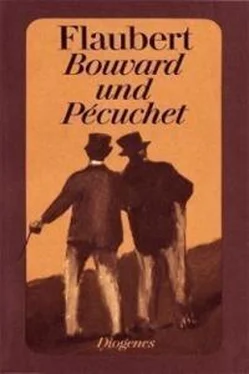They got back to the laboratory in order to examine the magnetic needles.
Not one of them had the least particle of the filings drawn off.
Then Germaine's assumption made them uneasy. He might get rabies, come back unawares, and make a dash at them.
Next day they went making inquiries everywhere, and for many years they turned up a by–path whenever they saw in the open country a dog at all resembling this one.
Their other experiments were unsuccessful. Contrary to the statements in the text–books, the pigeons which they bled, whether their stomachs were full or empty, died in the same space of time. Kittens sunk under water perished at the end of five minutes; and a goose, which they had stuffed with madder, presented periostea that were perfectly white.
The question of nutrition puzzled them.
How did it happen that the same juice is produced by bones, blood, lymph, and excrementitious materials? But one cannot follow the metamorphoses of an article of food. The man who uses only one of them is chemically equal to him who absorbs several. Vauquelin, having made a calculation of all the lime contained in the oats given as food to a hen, found a greater quantity of it in the shells of her eggs. So, then, a creation of substance takes place. In what way? Nothing is known about it.
It is not even known what is the strength of the heart. Borelli says it is what is necessary for lifting a weight of one hundred and eighty thousand pounds, while Kiell estimates it at about eight ounces; and from this they drew the conclusion that physiology is—as a well–worn phrase expresses it—the romance of medicine. As they were unable to understand it, they did not believe in it.
A month slipped away in doing nothing. Then they thought of their garden. The dead tree, displayed in the middle of it, was annoying, and accordingly, they squared it. This exercise fatigued them. Bouvard very often found it necessary to get the blacksmith to put his tools in order.
One day, as he was making his way to the forge, he was accosted by a man carrying a canvas bag on his back, who offered to sell him almanacs, pious books, holy medals, and lastly, the Health Manual of François Raspail. [5] Raspail, the author of the work here referred to, was called in to attend Gustave Flaubert's sister Caroline before her death in 1846.—TRANSLATOR.
This little book pleased him so much that he wrote to Barberou to send him the large work. Barberou sent it on, and in his letter mentioned an apothecary's shop for the prescriptions given in the work.
The simplicity of the doctrine charmed them. All diseases proceed from worms. They spoil the teeth, make the lungs hollow, enlarge the liver, ravage the intestines, and cause noises therein. The best thing for getting rid of them is camphor. Bouvard and Pécuchet adopted it. They took it in snuff, they chewed it and distributed it in cigarettes, in bottles of sedative water and pills of aloes. They even undertook the care of a hunchback. It was a child whom they had come across one fair–day. His mother, a beggar woman, brought him to them every morning. They rubbed his hump with camphorated grease, placed there for twenty minutes a mustard poultice, then covered it over with diachylum, and, in order to make sure of his coming back, gave him his breakfast.
As his mind was fixed on intestinal worms, Pécuchet noticed a singular spot on Madame Bordin's cheek. The doctor had for a long time been treating it with bitters. Round at first as a twenty–sou piece, this spot had enlarged and formed a red circle. They offered to cure it for her. She consented, but made it a condition that the ointment should be applied by Bouvard. She took a seat before the window, unfastened the upper portion of her corset, and remained with her cheek turned up, looking at him with a glance of her eye which would have been dangerous were it not for Pécuchet's presence. In the prescribed doses, and in spite of the horror felt with regard to mercury, they administered calomel. One month afterwards Madame Bordin was cured. She became a propagandist in their behalf, and the tax–collector, the mayor's secretary, the mayor himself, and everybody in Chavignolles sucked camphor by the aid of quills.
However, the hunchback did not get straight; the collector gave up his cigarette; it stopped up his chest twice as much. Foureau made complaints that the pills of aloes gave him hemorrhoids. Bouvard got a stomachache, and Pécuchet fearful headaches. They lost confidence in Raspail, but took care to say nothing about it, fearing that they might lessen their own importance.
They now exhibited great zeal about vaccine, learned how to bleed people over cabbage leaves, and even purchased a pair of lancets.
They accompanied the doctor to the houses of the poor, and then consulted their books. The symptoms noticed by the writers were not those which they had just observed. As for the names of diseases, they were Latin, Greek, French—a medley of every language. They are to be counted by thousands; and Linnæus's system of classification, with its genera and its species, is exceedingly convenient; but how was the species to be fixed? Then they got lost in the philosophy of medicine. They raved about the life–principle of Van Helmont, vitalism, Brownism, organicism, inquired of the doctor whence comes the germ of scrofula, towards what point the infectious miasma inclines, and the means in all cases of disease to distinguish the cause from its effects.
"The cause and the effect are entangled in one another," replied Vaucorbeil.
His want of logic disgusted them—and they went by themselves to visit the sick, making their way into the houses on the pretext of philanthropy. At the further end of rooms, on dirty mattresses, lay persons with faces hanging on one side, others who had them swollen or scarlet, or lemon–coloured, or very violet–hued, with pinched nostrils, trembling mouths, rattlings in the throat, hiccoughs, perspirations, and emissions like leather or stale cheese.
They read the prescriptions of their physicians, and were surprised at the fact that anodynes are sometimes excitants, and emetics purgatives, that the same remedy suits different ailments, and that a malady may disappear under opposite systems of treatment.
Nevertheless, they gave advice, got on the moral hobby again, and had the assurance to auscultate. Their imagination began to ferment. They wrote to the king, in order that there might be established in Calvados an institute of nurses for the sick, of which they would be the professors.
They would go to the apothecary at Bayeux (the one at Falaise had always a grudge against them on account of the jujube affair), and they gave him directions to manufacture, like the ancients, pila purgatoria , that is to say, medicaments in the shape of pellets, which, by dint of handling, become absorbed in the individual.
In accordance with the theory that by diminishing the heat we impede the watery humours, they suspended in her armchair to the beams of the ceiling a woman suffering from meningitis, and they were swinging her with all their force when the husband, coming on the scene, kicked them out. Finally, they scandalised the curé thoroughly by introducing the new fashion of thermometers in the rectum.
Typhoid fever broke out in the neighbourhood. Bouvard declared that he would not have anything to do with it. But the wife of Gouy, their farmer, came groaning to them. Her man was a fortnight sick, and M. Vaucorbeil was neglecting him. Pécuchet devoted himself to the case.
Lenticular spots on the chest, pains in the joints, stomach distended, tongue red, these were all symptoms of dothienenteritis. Recalling the statement of Raspail that by taking away the regulation of diet the fever may be suppressed, he ordered broth and a little meat.
Читать дальше








![Гюстав Флобер - Закат Карфагена [Сборник]](/books/414440/gyustav-flober-zakat-karfagena-sbornik-thumb.webp)


